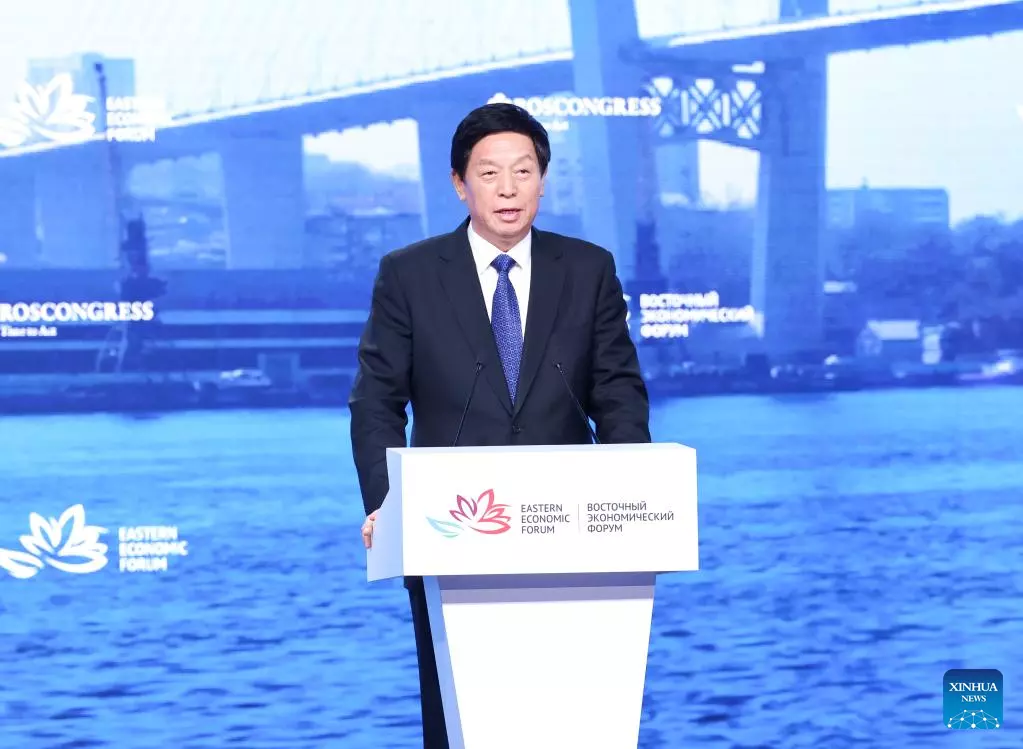VLADIVOSTOK, Sep 9(ABC): Li Zhanshu, chairman of the National People’s Congress Standing Committee, on Wednesday voiced China’s support for a multipolar world and regional cooperation in the Far East.
Li made the remarks when addressing the plenary session of the 7th Eastern Economic Forum (EEF) in Russia’s far eastern city of Vladivostok.
He delivered a speech titled “Advance the Process of World Multipolarization and Open a New Chapter in Regional Cooperation,” while Russian President Vladimir Putin, Myanmar’s State Administration Council Chairman Min Aung Hlaing, Mongolian Prime Minister Luvsannamsrai Oyun-Erdene, and Armenian Prime Minister Nikol Pashinyan also addressed the event in person.
Indian Prime Minister Narendra Modi, Malaysian Prime Minister Ismail Sabri Yaakob, and Vietnamese Prime Minister Pham Minh Chinh delivered video messages.
Li recalled that at the invitation of President Putin, Chinese President Xi Jinping participated in the EEF twice and delivered important speeches, expounding on China’s proposals and initiatives on developing China-Russia relations, promoting mutually beneficial regional cooperation, and maintaining regional peace and stability, which elicited warm response from the international community.
The theme of this year’s EEF “On the Path to a Multipolar World” is right in time, Li noted, adding that a multipolar world is the trend of history and the common expectation of the international community.
He said that since last year, President Xi has put forward the Global Development Initiative (GDI) and the Global Security Initiative (GSI), which have received responses and support from international organizations including the United Nations and many countries including Russia, injecting stability and positive energy into the world and contributing Chinese wisdom and solutions to solving problems of the times.
China will continue to work with the international community and take sustained and strong measures to ensure that the two initiatives take root and bear fruit, so as to bring tangible benefits to people around the world, Li said.
In February this year, President Xi and President Putin reached many important consensuses on expanding all-round practical cooperation between China and Russia, as well as practicing the vision of global governance featuring extensive consultation, joint contribution and shared benefits, Li noted.
With China being an important partner of Russia in developing the Far East, bilateral cooperation in the Far East is an important part of cooperation promoted and planned by the two heads of state personally, he said.
China will further strengthen all-round cooperation with Russia in trade, energy, agriculture, infrastructure construction, science and technology, education, medical treatment and culture, Li said, adding that China will continue to support and participate in the development of Russia’s Far East, advance the deep docking between the full revitalization of Northeast China and Russia’s Far East development national strategy, and promote fruitful cooperation between the two countries in the Far East.
With Northeast Asia being one of the most dynamic regions in the world, intensifying Far Eastern development and cooperation will open up important opportunities for promoting regional security and development, he stressed.
The top Chinese legislator put forward a three-point proposal.
First, the GSI should be implemented to maintain regional peace and stability. To build a harmonious and peaceful common home, there is no other way but for all parties to work together. All parties should uphold the vision of common, comprehensive, cooperative and sustainable security, pursue dialogue rather than confrontation, seek partnership rather than alliance, work for unity rather than division, adhere to the principle of the indivisibility of security, and inject positive energy into regional peace and stability.
Second, the GDI needs to be carried out to promote regional openness and integration. Efforts should be taken to boost partnerships, pool resources and platforms for cooperation, strengthen connectivity of development policies, tap the potential for innovative growth, maintain secure and unimpeded industrial and supply chains, and foster a more stable, secure and free trade and investment environment to inject new impetus into economic globalization.
Third, development strategies should be synergized to enhance China-Russia cooperation in the Far East. China will comprehensively implement the important consensuses reached by President Xi and President Putin, work actively to synergize the Belt and Road Initiative and the Eurasian Economic Union, and enrich the content of Far Eastern cooperation. To this end, the legislatures of the two countries should step up coordination to provide legislative guarantee.
China firmly supports and actively promotes a multipolar world, Li said, adding that China stands ready to work with Russia and other countries in the region to deepen Belt and Road cooperation, write a magnificent chapter of regional cooperation in Northeast Asia, and make unremitting efforts to promote the building of a community with a shared future for mankind.
In the Q&A session, Li answered questions about the current China-Russia relations and the prospects of bilateral cooperation in the Far East.
On Thursday morning, Li met with Oleg Kozhemyako, governor of Russia’s Primorye Territory, and visited an art and cultural complex in Vladivostok, which China participated in its construction.

